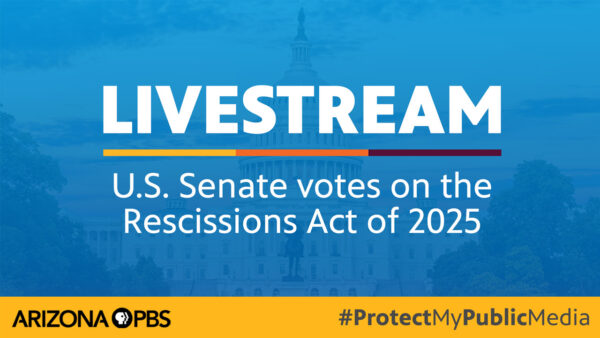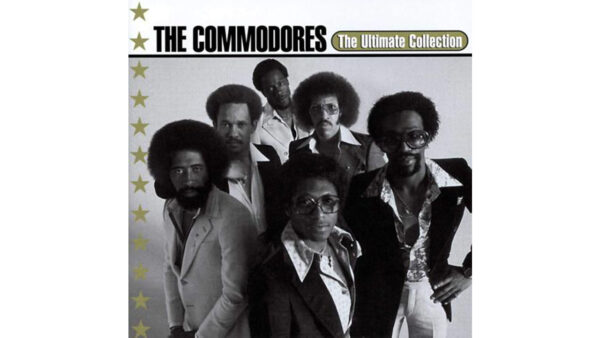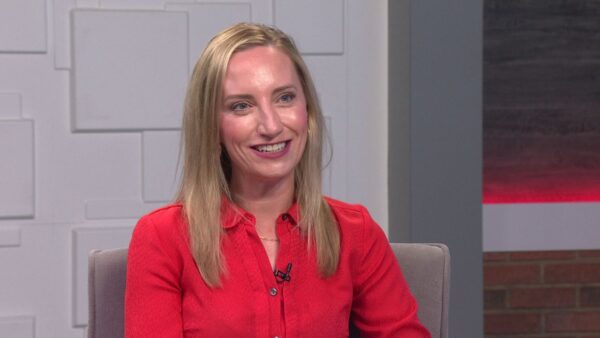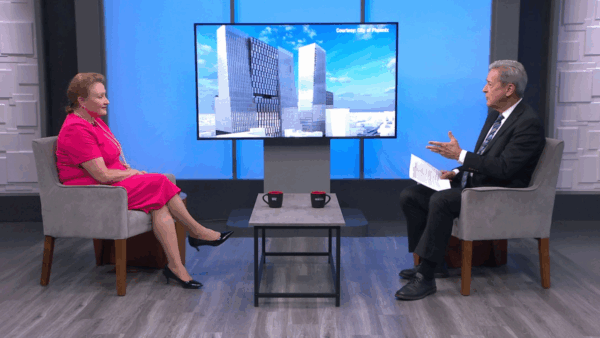John Dean, the former counsel to President Nixon and a key figure in the Watergate scandal, will make a presentation at Arizona State University’s Walter Cronkite School of Journalism and Mass Communication about how the scandal influenced American politics and journalism. Dean will discuss the topic on Arizona Horizon.
TED SIMONS: John Dean served as White House counsel for President Richard Nixon, and was a major player in the Watergate scandal from events leading to the 1972 break-ins at the democratic national committee, to the subsequent cover-up and eventually was a key witness for Watergate prosecutors. Dean pleaded guilty to one felony count of obstruction of justice in exchange for his testimony and spent four months in custody of the witness protection program. He became an investment banker, author of many books, and a lecturer. Joining us now is, John Dean. Welcome to "Arizona Horizon."
JOHN DEAN: My mother used to have "Arizona Horizon," the magazine. I haven't thought about that in years.
TED SIMONS: I think it's Arizona Highways.
JOHN DEAN: Right.
TED SIMONS: But it's close enough. A lot of folks, that's all they knew of us, was "Arizona Highways."
TED SIMONS: How do you see your role in U.S. history?
JOHN DEAN: Well, good question. It depends on who's writing the history. As Nixon famously said. I've never been concerned about the truth coming out. In fact, I did a book recently on the tapes, what's on the tapes. I titled the book "The Nixon defense: What he knew and when he knew it." One of the "New York Times" reviews said it really should have been the Dean defense. No one had transcribed all of his Watergate conversations. I come out very well. They realized that I'm trying to end the cover-up; I'm trying to convince my colleagues to come forward and do the right thing. I'm trying to get the President to do the right thing. I couldn't have asked for better. And I always suspected that would be in there. And I wasn't able to testify on that kind of detail because I didn't remember that kind of detail.
TED SIMONS: Watergate is such a behemoth in terms of American history. Your role in U.S. history could change, it's changed before, it could continue to change, couldn't it?
JOHN DEAN: I don't know that it would change. What I was, was sort of the guy who broke rank, let my colleagues know I was going to do it. I had, had it with the cover-up and forced the issue. I read recently some material that Nixon had written in his memoir about my testimony where he said they in a sense knew they were dead after my testimony. It wasn't so much my Watergate testimony, where they thought they had some defenses. But because I explained the atmosphere in which this happened. He said we never could recover from that.
TED SIMONS: When you broke the idea there was taping gone on, that was huge, that was a bombshell.
JOHN DEAN: When I broke the news, everybody ignored it. What happened is it provoked eventually the Senate Watergate committee staff to follow up. Actually the member of the staff who was trying to discredit my testimony saying to Alex Butterfield when they called him in, Mr. Butterfield, Dean made this statement he thought he was taped, that's silly, isn't it? Butterfield said, "Well he didn't know". The rest was history, of course.
TED SIMONS: If there was a smoking gun, it was those tapes wasn't it?
JOHN DEAN: Clearly. It resolved who was telling the truth, was it me or was it the tapes. I didn't know it was a system-wide. I just knew because of his behavior in one of our conversations, happened to be on April 15th, where at one point in the conversation after a bunch of leading questions, which was unusual in our conversations. He gets up and goes to the corner of office, in a stage whisper he says, I was foolish to talk to Chuck Colson, another aide, about clemency for Howard Hunt, one of the Watergate burglars. I said, "Yes Mr. President that was probably obstruction." At that moment it clicked in my head, he's recording this. I put it in my testimony at the very last moment because it was really something I wasn't positive of, but I also was bootstrapping. -- Not only that, I thought other conversations would have been recorded. If I think I'm recorded and I did, I'm not going to lie about those conversations.
TED SIMONS: You mentioned in your new book, you go through a lot of these tapes. Did you transcribe these personally, all of them?
JOHN DEAN: Some of them. My editor asked me, do I have any questions about Watergate. One big one, how could anybody as savvy as Richard Nixon let a bungled burglary destroy his Presidency? I was not in the office all the time. I only had like 30 conversations very late with Nixon. I said the answer's on the tapes. Most of them have probably been transcribed. Well that was not correct. Nobody had even catalogued them all. I found a thousand conversations, 600 I don't think anybody outside of the archives had ever listened to. I didn't find a tape during the process that didn't give me revelations. I started, realizing this is overwhelming, I can't do it alone. I asked a friend of mine who teaches an archival science course if he had anybody he thought might be a good transcriber. He said, "yeah I do." The woman he selected was a Godsend. She was a former legal secretary, a little older than the other students and kind of became the team captain, if you will. She did 500 of a thousand conversations and she was good.
TED SIMONS: You said there were revelations along the way. What surprised you most? I mean, keep that question. I have a follow-up in a second. What surprised you the most?
JOHN DEAN: The one that really kind of -- I said I can't believe what I'm listening to, is when he and Haldeman get into my sex life. They know I'm married to a very attractive lady, both then and now. And those tapes just blew me away. I put them in the book. I couldn't exclude them because I was trying to let the tapes tell the story. So the book has sex too.
TED SIMONS: A modern book there. Back to Richard Nixon and your dealings with him. He is such an enigma. He continues to be, will always be that walking question mark. Did he ever fully understand why he had to leave office? Did he ever -- did he get it?
JOHN DEAN: Yeah, he did get it. I just read and reviewed for this Friday a book by -- Bob Woodward on Alex Butterfield, the man who revealed the taping, who was instructed to install it. Later when the Senate asked him, told the truth, that there was a taping system. Those of us who knew Alex well knew he had a thousand Nixon stories. Before the taping system was put in February of 1971. Nixon started January of 69. Butterfield is kind of the human tape recorder for that era. Had the most contact of anybody in the White House with Nixon and has a remarkable -- 89, still has a great memory. So Bob found this source and found some dynamite material. He also kept 20 boxes of files of documents that did not get into the system. Some really incriminating material on Nixon on Vietnam in particular. We keep learning more about Nixon and the answer is, you know, he is a very complex character. He is a very shy man for a politician. He is very awkward with people he doesn't know. Butterfield tells wonderful stories; it takes weeks for Haldeman to introduce him into the new job because he has to get to know people. I didn't start dealing with Nixon for years after I started -- then when he discovers me, he has another thing that surprised me, all the nice things he had to say on the tapes about me. But anyway -- Haldeman at one point gave an interview to Mike Wallace on "60 Minutes" and he later wrote about this. Not on camera Mike Wallace asked Haldeman what is Nixon really like. And Haldeman said, "He said he's the weirdest man I ever met." Butterfield says the same. I didn't have as many dealings as they did. Haldeman said for example, "the only time I ever shook hands with Nixon was the day he fired me and forced me to resign." He didn't know how many children I had for all the years I worked with him. This is a very unusual character.
TED SIMONS: You mentioned Bob Woodward and his new book. Your thoughts on how the media investigated Watergate.
JOHN DEAN: I'm talking about that tonight in a very abbreviated form because it's not a long form. I'm doing a course here at ASU in the spring where we're going to do some deep diving into this subject. I've been gathering material for 40 years and have a remarkable archive. Time to share that with students. And being appointed to the Goldwater Chair for American Institutions here, it's just the perfect opportunity to share that kind of material. Your question again?
TED SIMONS: In general, how the media covered Watergate. Woodward and Bernstein obviously --
JOHN DEAN: They are the first part of the story. "The Washington Post," then Bradley. Len Downie here at the school could tell us more about how the "Post" took this story on. His editor, Barry Sussman who I've gotten to know over the years, we smelled it. We just knew this couldn't be a bunch of low-level people. How many -- who other than the Republicans would be break in and trying to bug the Democrats other than the Republicans? Who other than Richard Nixon would be somehow responsible for the Republicans?
TED SIMONS: Reaction to Woodward and Bernstein the reporting in the post. The reaction to the media coverage from inside the White House.
JOHN DEAN: They never wrote a story that troubled us. -- Their stories, Ziegler went out, the press secretary made all kinds of noise to try to intimidate them, because Nixon was most annoyed at the way they stayed on the story. Where the "Post" had their big impact is not because they broke new information. We learn what they were writing from the investigators before they did. But they were just reporting inside the beltway. And their greatest impact was is on people in the beltway, the Congress, people in the courthouse, the Justice Department, the judges, the senators. These are the people who were reading Woodward and Bernstein and they said, this investigation isn't going to go away. That's the big impact they have.
TED SIMONS: I know quote, unquote, associates of Dean were credited as being sources for Woodward and Bernstein.
JOHN DEAN: Very late, after I broke rank.
TED SIMONS: Not before that?
JOHN DEAN: I never had a contact with Bob or Carl until long after the fact. One of my attorneys who told me literally decades after the fact what he had done, he kept me very honest when I went before the Senate or anybody else. Any report or rapport I've had with any reporter has always been on the record. And that was true.
TED SIMONS: As far as confidential sources, inside the White House did they seem to understand where some of this stuff was coming from? Did they have ideas where this stuff was coming from?
JOHN DEAN: We knew that Mark Felt, who became Deep Throat for the "Washington Post," the great anonymous source that fed Woodward, we knew who he was. We didn't connect him up with the Deep Throat character because it doesn't appear until February of 76, 74 excuse me. When they write and publish "All the President's Men", and that's where that character is. We did know that Felt was leaking. I went over to the justice department one day, the head of the criminal division who had been in the FBI with Felt. Was not a Felt fan, he said we called him the white rat because he talks to the press so much. He was prematurely gray-haired. Anyway, Henry Peterson tells me a general counsel of one of the major news organizations has come in here. They are very concerned that Felt is giving them Grand Jury information. They don't want to get involved in obstruction of justice, but he is leaking all over them like a sieve. I take that back to Haldeman, Haldeman takes it to the president and later John Mitchel will get confirmation of that same general council though another source. So yes we absolutely knew Felt was leaking.
TED SIMONS: -- Leonard Downie says the "post" never published inaccurate information coming from Felt. - I believe he says nothing inaccurate about Deep Throat ever appeared in the Washington Post. Do you take issue?
JOHN DEAN: It might be accurate in the fact that, that's what Felt said. I have very deep reservations about what Felt said accurately. Bob and I have agreed to disagree on Felt because I have about half of his information as being wrong.
TED SIMONS: And Bob Woodward says no.
JOHN DEAN: He and I have debated it back and forth. And he said John, "why don't we just agree to disagree on this." I said Bob, "I can show you in the record where Felt's point here is just dead wrong." I just ran into another one, someone who was one of Bob's lawyers, the aide to the head of the campaign committee was thinking of writing more about this. He was a very young lawyer in the firm that defended him. He's a Phoenix person, so this might be of local interest. Anyway, he quotes, he said, I just went down and looked at Bob and Carl's notes at the Ranson Center where they have donated or arranged to have their papers. He said, I read what Mark Felt said about Bob, that he was running a wire-tapping ring. I said, those are just dead wrong. You can prove those are wrong.
TED SIMONS: And it sounds like the "Post," Downie and others from the Post were saying they knew they were but didn't necessarily publish. Sounds like Mark Felt was just talking to talk, half the time.
JOHN DEAN: Late in the game when he knows he's on his way out, one of the biggest conversations Woodward has with him is right after he was fired by the acting director. Then he just kind of unloads in that conversation.
TED SIMONS: As far as you're concerned -- I want to stick with the media a little bit here -- White House plans in attacking the story, eventually in attacking you. What were you aware of?
JOHN DEAN: Well, I -- when I broke rank and, you know, I was very open with my colleagues about what I was going to do and when and how I was going to do it. It's all on the tapes. And they don't take very kindly to it. There are literally maybe 50 conversations where they just go in this huge circle, they keep -- Nixon, Haldeman and Ehrlichman -- they were very hard to write. I didn't want to bore the reader but rather see what moved the story forward. They always came back to the same point, let's make Dean the scapegoat. I'm not communicating with them at that point. The one time I did talk to the press in the White House I had my secretary call the "post" and a few other papers and say I'm refusing to be a scapegoat. I sent that message directly to them. After I break rank I learn very quickly that they are -- they have a full media press on trying to discredit me. It was standard White House attack. I mean, they have Joe Alsop calling me an under-dwelling slug. I go from being literally Nixon's favorite guy, new guy on the staff he's discovered, to his number one enemy because I refused to lie.
TED SIMONS: Names. William Safire, Jack Anderson, Daniel Shore, very respected journalists.
JOHN DEAN: Shore apologized to me before he died. Anderson would just take anything. They were all coming from Ehrlichman and somewhat from Coleson to other aides. They hammered me. As a result of that, Ted, it gets so serious that at one point the -- first of all, the general counsel of the Senate Watergate committee, Sam Dash comes to me and says, we can't do this. We have talked to Archibald Cox and we believe you should be in the witness protection program, given the level the threats. These aren't just crazies writing in, this is serious stuff. I agreed to go into the witness protection program. I was in the custody of them for four months. I was actually in and out of the program for a year and a half before my testimony. Then when it became time to become incarcerated, rather than send me to jail, I was put in a safe house in Maryland and driven to Washington virtually every day to meet with the prosecutors.
TED SIMONS: Technically you never served time in prison.
JOHN DEAN: No, never did.
TED SIMONS: And you got credit for time served that way?
JOHN DEAN: After four months they put me in -- obviously the judge and prosecutors thought I would be a stronger witness if I was actually somehow incarcerated at the time I testified as a witness against the chief of staff Bob Haldeman, John Mitchell, the top domestic advisor, the guys I had worked for and carried out their instructions. They thought I would be a better witness in those circumstances. After the trial ended the judge makes a decision, I'm letting him go on time served which was 127 days. I at that point talked to Moe and said, listen, we can't stay in this witness protection program. I'm not going to some little town with a picket fence and change my name. We ended it at that point.
TED SIMONS: Just are just for those who may not have been at age at that time or may have forgotten the depth of all this, you've got all this activity going on in and around the White House. You've got the media, some very important names, perhaps using stories planted from the White House. You've got the White House no doubt with critics planting stories in other areas. I don't know where the "New York Times" was in all this but "The Washington Post" was all over this story.
JOHN DEAN: The "New York Times" never to me seemed to understand the story. I don't think they institutionally understand it today. They have published some hair-brained stuff over the years. Stuff you would never see in the Washington Post because they institutionally understand it.
TED SIMONS: Ben Bradley, was he the reason the Post had such --
JOHN DEAN: Ben Bradley, Bob and Carl, the entire -- Len Downie, the entire editorial staff understood the story, Katherine Graham understood it, her son understood it. They had some great editors there in that era, too.
TED SIMONS: At the time did you understand the gravity of what was going on? Eventually obviously you did, but in the heat of the moment did you understand the seriousness of what was going on?
JOHN DEAN: I knew I was in a very difficult fight with the President of the United States. It was my word against the President. He was corroborated by his chief of staff, corroborated by the attorney general, by Chuck Coleson, and it was my word against everybody else. Had the tapes not come out I might have had 500 years of perjury.
TED SIMONS: But that's the personal and protective response. Could you see a constitutional crisis on the horizon from all -- we're talking about a burglary at an office complex.
JOHN DEAN: What I did in my testimony is I broadened it to show it wasn't just an aberration, it was not just accidental. We now know there are tapes with Nixon literally pounding the desk demanding a break-in in the Brookings Institute, a think tank in Washington. Which I at the time not knowing about it -- I jump on a plane and fly to San Clemente and get it killed. It's clearly on the tapes but you know they don't like to give me credit for it.
TED SIMONS: You do have your critics. And they abound and they seem to abide as well.
JOHN DEAN: It just baffles me, these guys who are making league with certified perjurers. People who have been proven beyond a reasonable doubt, everything they said was true notwithstanding their convictions and everything I said was false and it's still ongoing.
TED SIMONS: And you have these critiques saying, "You can't believe what John Dean says." When you hear people say that how do you respond?
JOHN DEAN: I say read the -- listen to the tapes, look at the evidence. Why in the world would I want to falsify this? Some of the phenomenal conspiracy theories, if I went out and said I did that, I would be -- I would make a million dollars first. But then people would say this guy is a colossal liar. I could never do it, it didn't happen. But they keep coming up with new theories of what I did and how I was literally running the government at one point here as a middle left staff man who had no access to the President at all.
TED SIMONS: It's been a great conversation. Before we let you go, just a simple question. What was on the 18 and a half-minute gap of tape? What was being said there?
JOHN DEAN: It is a wonderful media mystery. I thought it was so important I did a full appendix on it in the new book where I explain, first of all, that Rose Woods could not have made the erasure. It's mechanically impossible. It's not as important as what was there, because there was nothing said there that wasn't said 100 times in those conversations.
TED SIMONS: Is it your impression that she happened to erase --
JOHN DEAN: She couldn't have. Its mechanically impossible for her to do it. She's totally mistaken. It was erased before she got to it.
TED SIMONS: It must have been pretty important.
JOHN DEAN: It was because of the timing as I explain in the appendix. When this issue arises it destroys his earlier defense.
TED SIMONS: It wouldn't be revelatory now as opposed to then.
JOHN DEAN: Not at all.
TED SIMONS: John Dean, its been a pleasure -- good to have you here - thanks for joining us. I'm Ted Simons, thank you for joining us, you have a great evening.
John Dean: Former Counsel to President Nixon























